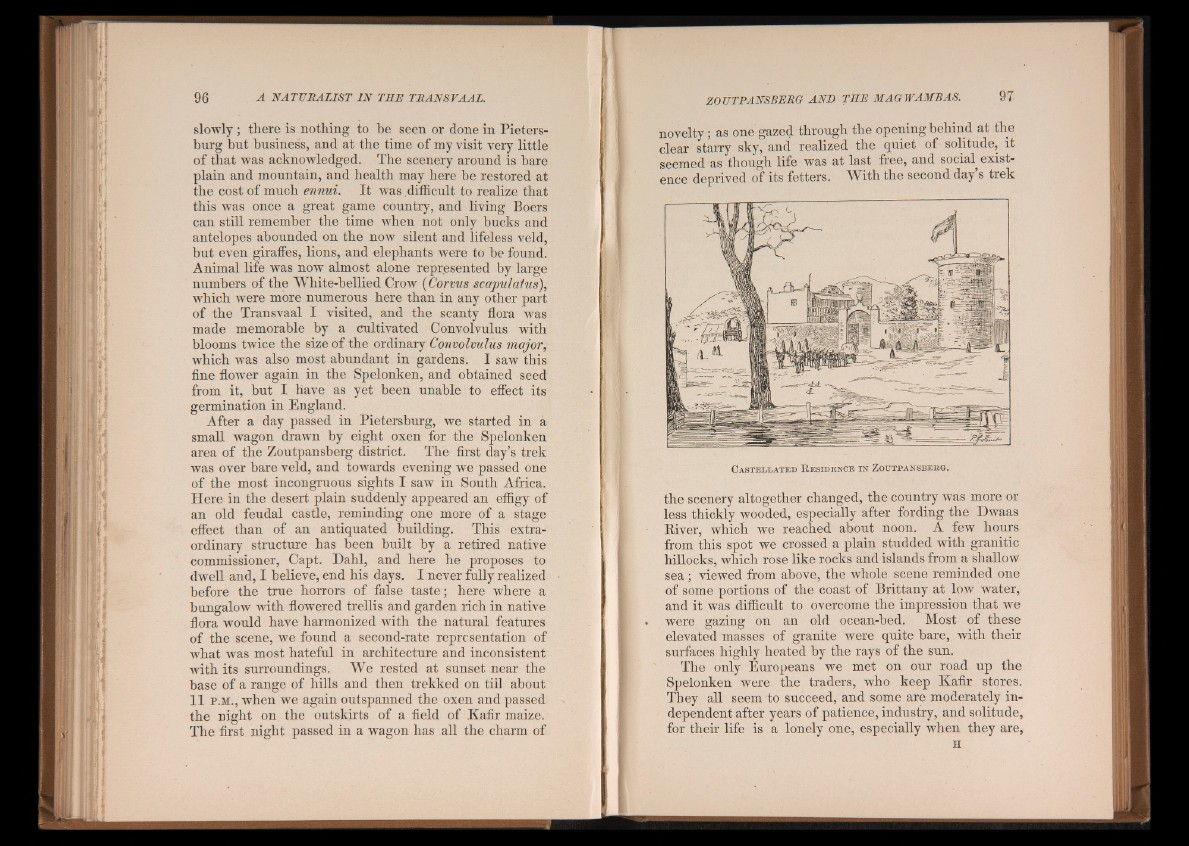
slowly ; there is nothing to be seen or done in Pieters-
burg but business, and at the time of my visit very little
of that was acknowledged. The scenery around is bare
plain and mountain, and health may here be restored at
the cost of much ennui. It was.difficult to realize that
this was once a great game country, and living Boers
can still remember the time when not only bucks and
antelopes abounded on the now silent and lifeless veld,
but even giraffes, lions, and elephants were to be found.
Animal life was now almost alone represented by large
numbers of the White-bellied Crow (Corvus scajmlatus),
which were more numerous here than in any other part
of the Transvaal I visited, and the scanty flora was
made memorable by a cultivated Convolvulus with
blooms twice the size of the ordinary Convolvulus major,
which was also most abundant in gardens. I saw this
fine flower again in the Spelonken, and obtained seed
from it, but I have as yet been unable to effect its
germination in England.
After a day passed in Pietersburg, we started in a
small wagon drawn by eight oxen for the Spelonken
area of the Zoutpansherg district. The first day’s trek
was over hare veld, and towards evening we passed one
of the most incongruous sights I saw in South Africa.
Here in the desert plain suddenly appeared an effigy of
an old feudal castle, reminding one more of a stage
effect than of an antiquated building. This extraordinary
structure has been built by a retired native
commissioner, Capt. Dahl, and here he proposes to
dwell and, I believe, end his days. I never fully realized
before the true horrors of false taste; here where a
bungalow with flowered trellis and garden rich in native
flora would have harmonized with the natural features
of the scene, we found a second-rate representation of
what was most hateful in architecture and inconsistent
with its surroundings. We rested at sunset near the
base of a range of hills and then trekked on till about
1 1 p.m., when we again outspanned the oxen and passed
the night on the outskirts of a field of Kafir maize.
The first night passed in a wagon has all the charm of
novelty; as one gazed through the opening behind at the
clear starry sky, and realized the quiet of solitude, it
seemed as though life was at last tree, and social^ existence
deprived of its fetters. With the second day s trek
the scenery altogether changed, the country was more or
less thickly wooded, especially after fording the Dwaas
River, which we reached about noon. A few hours
from this spot we crossed a plain studded with granitic
hillocks, which rose like rocks and islands from a shallow
sea; viewed from above, the whole scene reminded one
of some portions of the coast of Brittany at low water,
and it was difficult to overcome the impression that we
were gazing on an old ocean-bed. Most of these
elevated masses of granite were quite hare, with their
surfaces highly heated by the rays of the sun.
The only Europeans we met on our road up the
Spelonken were the traders, who keep Kafir stores.
They all seem to succeed, and some are moderately independent
after years of patience, industry, and solitude,
for their life is a lonely one, especially when they are,
H